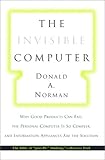The Invisible Computer: Why Good Products Can Fail, the Personal Computer Is So Complex, and Information Appliances Are the Solution
The Invisible Computer: Why Good Products Can Fail, the Personal Computer Is So Complex, and Information Appliances Are the Solution

- ISBN13: 9780262640411
- Condition: New
- Notes: BRAND NEW FROM PUBLISHER! BUY WITH CONFIDENCE, Over one million books sold! 98% Positive feedback. Compare our books, prices and service to the competition. 100% Satisfaction Guaranteed
". . . the bible of `post-PC' thinking." -- Business Week
"Don Norman has established himself as high technology's leading thinker on user interfaces and on why PCs are too complex." -- Wall Street Journal
Technologies have a life cycle, says Donald A. Norman, and they must change as they pass from youth to maturity. Alas, the computer industry thinks it is still in its rebellious teenage years, exalting in technical complexity. Customers want change. They are ready for products that offer convenience, ease of use, and pleasure. The technology should be invisible, hidden from sight.
In this book Norman shows why the computer is so difficult to use and why this complexity is fundamental to its nature. The only answer is to develop information appliances that fit people's needs and lives. To do this, companies have to change the way they develop products. They need to start with an understanding of people: user needs first, technology last--the opposite of how things are done now.Currently, computer users must navigate a sea of guidebooks, frequently asked questions (FAQs), and wizards to perform a task such as searching the Web or creating a spreadsheet. While Donald Norman acknowledges that the personal computer allows for "flexibility and power," he also makes its limitations perfectly clear. "The personal computer is perhaps the most frustrating technology ever," he writes. "It should be quiet, invisible, unobtrusive." His vision is that of the "information appliance," digital tools created to answer our specific needs, yet interconnected to allow communication between devices.
His solution? "Design the tool to fit so well that the tool becomes a part of the task." He proposes using the PC as the infrastructure for devices hidden in walls, in car dashboards, and held in the palm of the hand. A word of caution: some of Norman's zealotry leads to a certain creepiness (global positioning body implants) and goofiness (electric-power-generating plants in shoes). His message, though, is reasonably situated in the concept that the tools should bend to fit us and our goals: we sit down to write, not to word process; to balance bank accounts, not to fill in cells on a spreadsheet. In evenly measuring out the future of humanity's technological needs--and the limitations of the PC's current incarnation--Norman presents a formidable argument for a renaissance of the information appliance. --Jennifer Buckendorff

List Price: $ 26.00
Price: $ 6.50
RelatedComputers Products
No comments:
Post a Comment